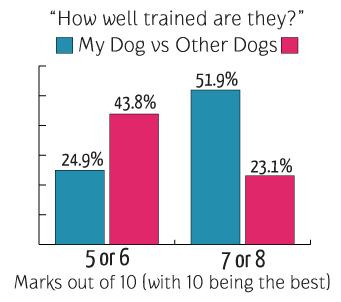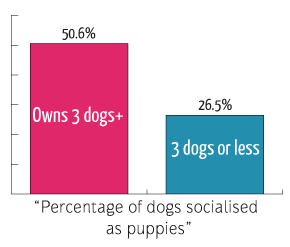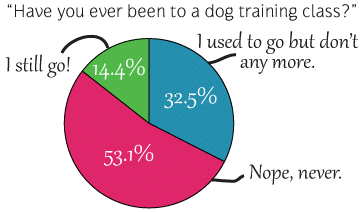After the success of last month’s dog world records post I decided that it was time to do something with a little more substance. So, as a rose-tinted dog owner with three very well behaved pooches (I’d give them at least an 8 out of 10) I decided to set up a dog training survey to find out what everyone else thought. With just over 1000 respondents from all over the world (mainly the UK and US) here’s what I found.
We hope you enjoy the second post in our series of infographics… If so don’t forget to check out our collection of dog beds, dog coats and raincoats and waterproof dog collars
How well trained?

Firstly, pretty much all owners think that their dogs are better trained than other people do. A whopping 46.2% of people gave other people’s dogs a 4 or 5 out of 10 while 51.9% of people gave their own dog a 7 or 8 when asked how well trained they thought they were. This hardly surprising as we all like to see the best side of our own. What was more noticeable, however, was that those who don’t own a dog themselves were more likely to give dogs a higher score (the most popular being 7 out of 10).
Puppy Socialisation

Interestingly, only 33.2% of dogs were formally socialised as a puppy. The plot thickens when you realise that owners who have 3 or more dogs are almost twice as likely to have attended socialisation classes – a massive leap! The ‘my puppy gets lots of socialisation at home’ excuse isn’t applicable here – maybe we really do learn from early mistakes. This theory is backed up by the fact that 20.1% of owners who went to training courses gave their dog a self certification of 9 or 10 for how well trained they were, while only 13.1% of those who didn’t attend gave the same scores.
Teaching a dog new tricks
Happily, 94% of respondents reported that they do at least some training with their dog at home… and of the other 6% there were a few who believed their dog to be perfectly trained. I’m not sure if they were drunk when replying but if not they must be the luckiest dog owners in the world (or have Cesar Milan as a personal friend).

On a related note, 46.9% of people said that they had been to a dog training class of some kind… which still leaves over half that hadn’t set foot in one of the many dog training schools. Of those only 14.4% still go, with a massive 32.5% no longer attending at all. This can most likely be accounted for by those that took their dog training as a puppy but, sadly, my research didn’t have a specific question for this. Maybe I’ll find out next time around!
The average time spent training was between 1 and 3 hours per week, although 6.6% very committed owners spend more than 20 hours a week… and, of course, these were more likely to give their dog a 9 or 10 out of 10 for how well trained they are. Somewhat worryingly, 22.4% of people spend less than 30 minutes per week training their dog (with 3.2% doing nothing at all).
Sit and Stay
There was an interesting split in what dog owners thought of as important commands. 54.8% of people believed recall to be the most important while 26.9% opted for stay, 12.9% said sit and a couple of brave souls went for ‘roll over’. It’d be interesting to know what dog trainers think of this.

Of the commands that a dog actually knows, sit was by far the best taught with 90.2% of dogs reportedly knowing to put their bums on the floor when commanded. Stay (83.8%), Recall (82.1%) and Lie Down (69.6%) weren’t far behind though, intimating that there are some well trained dogs out there somewhere (contrary, as mentioned earlier, to popular belief).

So, we know how well trained and which commands dogs know… but how easy were they to train? As a general rule, a 7 or 8 out of 10 was the answer here and when drilling down further it becomes apparent that those who went to socialisation classes found training to be far easier. 40.2% of people who had been gave their dog an 8 or 9, while only 32.3% of people who hadn’t gave the same answer. At the other end of the scale, 9.6% that hadn’t attended gave their dog a 3 or less versus only 4.5% who had attended.
Rewarding good behaviour
Finally, and on a happy note, 99.5% of people now believe that rewarding a dog for good behaviour is an acceptable training and learning method. Education in humans works too! As for the other 0.5%… they generally found training harder than others (although the sample was so small that it’s hard to tell if that was coincidence or not).
So, the moral of all this? Socialisation classes work, owners with more than one dog have learnt from their mistakes, and we all think our dogs are better trained than they are… although it’s only other dog owners that disagree with us. Remember, we’re all trainee dog owners, no matter how experienced we are… and a workout with our canine friends is great fun for everyone!




This is a really nicely put together piece of information about dog training and I shall send links to many of my dog friends.
Thanks for this, Matt!
The result highlighting that we all think our dogs are better trained than dogs belonging to other people, made me giggle……..We all believe we own the best dog/s (of course)!
Great work, nice lay out of information, thank you 🙂
I’d love to see a comparison of adopted older dogs vs. puppies. (If you are planning on doing more research). I adopted my greyhound when he was 4.5 years old – he knows all his obedience commands (he doesn’t care much for sit and move into down if asked to sit stay). He also knows agility we go to agility classes for an hour once to twice a week and he can do all the equipment.
Loved the info!
I for one know that my dogs are not better trained than dogs belonging to other people. In fact, I have to make up my mind and start training them better. Two big dogs (sight).
I’ve worked hard with all my dogs in order to make them happy and balanced and also to make my own being with them as happy as possible. My present dog is a rescue case and still, after two years of training, we have some issues. Won’t give up of course for it’s own good, I’m always responsible of him and his wellbeing. Trust and balance can be so easily lost, must train myself by learning what he really needs, how dog’s mind works…. patience, patience and patience…
Thanks for this, Matt! Very interesting 🙂
Thank you for providing this information. I really liked it. Keep up the quality work, man!
I really enjoyed your news letter! Great layout and you made it knowledgable and “fun”.
Mine are well trained until they see a rabbit and then they’re off, all training forgotten! Oh well!
I like the information you have provided, very useful. My Buddy is fully trained and knows many words.
My dogs are better trained than most, because I’m a trainer! I will say that I agree with the statistics, and am saddened by them. When you think that most dogs that end up in shelters during adolescence are there because they simply became “untrained doggy teenagers” or chewed something up, or escaped the yard and didn’t have a good recall, etc. it’s so upsetting to think that with just a little training, the dog could have kept its home!!! Most people I talk to, who aren’t aware I’m a trainer, but who share their dog problems with me, or who are trying to re-home a dog, have never been to a class. Those who take their puppies to class EARLY for socialization and positive training (while pup is between age 8-16 weeks) are MUCH more likely to have a well trained dog, and to love that dog enough to want to do anything to keep it.
Would somebody please kindly tell me what the ‘recall’ command means?
Peter, the recall command is when you call your dog to come. It is what I concider to be the most important thing you can teach your dog as it could possibly save your dogs life one day. If you would like to know more, please visit my website and feel free to contact me at anytime.
This is fun, great job!
GREAT article! Thanks for putting this all together. I plan on sharing it on my blog. As a professional trainer I agree 100% that a trained dog is a happy dog. The household is calmer, the dogs get to do more things and go more places, and the dogs therefore get their needs met.
Thanks for posting!
Great post, we all need to do a little more when it comes to training our fuzzy faced friends. It is consistant training that will keep your dog at home and not in a shelter or worse.